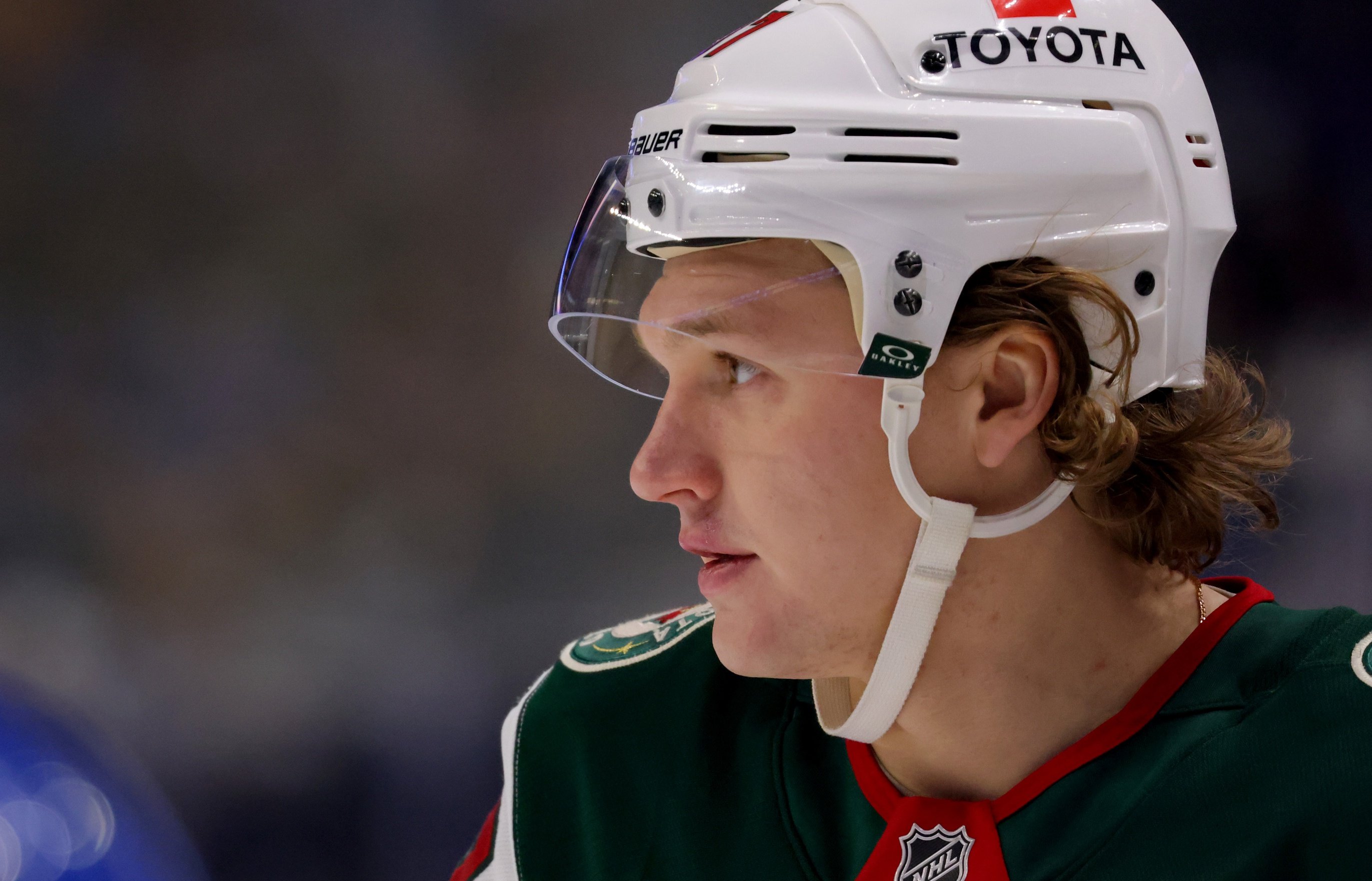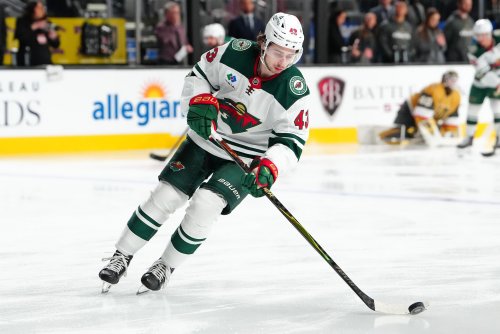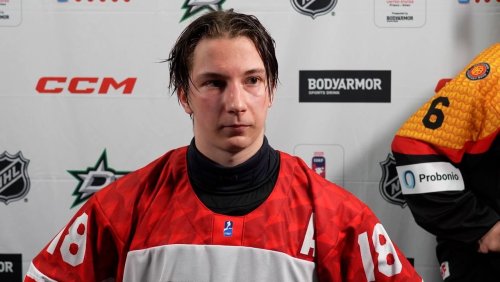
It’s been a trying few weeks for Minnesota Wild fans. Injuries to Jonas Brodin, Jake Middleton, and Joel Eriksson Ek, just to name a few, have slowed down what started as a potentially historic 2024-25 season. After losing last season to injuries, it’s enough to make even the most optimistic fans queasy.
Allow me to serve you a tonic of sorts. Take a sip of the Forest Green Kool-Aid.
It’s fairly typical of NHL GMs to make shortsighted moves because they want to maximize job security. However, that often results in a vicious cycle of mediocre playoff pushes followed by winless rebuilds. It’s one of the reasons that Minnesota sports fans dread the words “competitive rebuild.”
But Bill Guerin seems to have pulled it off. Not only are the Wild primed to compete for a Stanley Cup, they didn’t have to mortgage their future to do it.
The contracts Guerin has signed deep into the future have usually eaten into today’s salary cap to make more space later. He’s also solidified that future with high-end prospects. Most recently, he shored up the future of the defense by acquiring David Jiricek.
The Wild also never had to trudge through multiple seasons at the bottom of the league standings. The worst came last year when injuries derailed an otherwise competitive roster.
Minnesota’s resulting roster seems too good to be true, given that it didn’t require a lot of pain to build it. Over the past four seasons, Minnesota has placed ninth, fifth, 11th, and 20th in the NHL standings. Say what you will about the playoff failures, but those seasons all provided fans with 82 games of excellent hockey aside from the injury-riddled 2023-24 campaign.
Usually, that type of performance drains the prospect pipeline. That has not been the case for the Wild. They are set up nicely for the immediate future as well as the distant future.
Prepare to be visited by three spirits: the ghost of Wild Present, Wild Immediate Future, and Wild Distant Future. Remember to take it with a grain of salt, as these are not the shadows of what Will be but shadows of the things that May be, only.
Wild Present
A cleverer writer may have tabbed this section of the post “result of roster moves past,” but, regrettably, that was not in the budget.
There is still much ink to spill on this year’s team. Also, fans have already decided how good or bad the Wild will be this year.
Rather than trying to argue that topic one way or another, it’s more relevant to discuss the roster-building strategy that supported winning this season despite $14.75 million in dead cap.
First, consider the limited roster space for developmental players like Liam Ohgren. While the Wild gave him the opportunity to play on the opening night roster, they sent him down to play in Iowa after the coaching staff decided to play Marcus Johansson in the top six. They must believe Johansson gives them a better chance to win each night, and they’ve prioritized that over handing top-six minutes to Ohgren as a learning experience.
Guerin also signed Ryan Hartman, Marcus Foligno, Yakov Trenin, and Zach Bogosian in free agency. Each of those contracts carries cap hits into future years. Also, like most free-agent contracts, they carry greater value in the first few years of the contract.
Based on that logic, contracts for Jonas Brodin, Jared Spurgeon, and Jake Middleton fall into the same category. They borrow cap from the future to ensure those players are available now, even if they’ll become inefficient later.
All six veterans play a key role in shoring up Minnesota’s league-leading defensive effort. Without that elite defense, it’s unlikely the Wild would have been capable of such a promising performance this year.
If those moves aren’t clear enough evidence that Guerin wants to win this year, take it from owner Craig Leipold. He identified 2024-25 as the second year of a five-year Stanley Cup window.
Wild Immediate Future
Doesn’t it seem like the Wild are always promising they are just a few years away from a Stanley Cup? If you’re skeptical, take note of the upcoming roster from 2025-26 through 2027-28.
They have budding star Matt Boldy signed at $7 million per year. Joel Eriksson Ek at $5.25 million. Brock Faber, Zeev Buium, Jared Spurgeon, Jake Middleton, and Jonas Brodin manning the blue line. The Wild already have efficient deals for the cornerstones of the roster in place.
$13 million in cap relief from the Parise and Suter buyouts kicks in next season, as well as another $2 million from Johansson’s contract.
Kirill Kaprizov’s next contract is the boogeyman for this timeframe. However, an increasing salary cap and expiring contracts for Mats Zuccarello and Bogosian create space for Kaprizov’s raise. As for concerns about whether he wants to re-sign in Minnesota, his Hart Trophy scoring pace should assuage them. He should have no qualms that the Wild put him in winning positions.
The most valuable part of a Kaprizov extension is that the Wild will pay him through his prime years. Kaprizov turns 28 this fall, meaning he’ll play his age-28, -29, and -30 seasons to close out Leipold’s five-year plan. Even if his contract breaks the bank, it’s incredibly rare for a free agent contract to be inefficient over its first few years -- especially for players in their late-20’s.
There are so many sweeteners in the roster moves the Wild made that overlap with Kaprizov’s prime. They are specifically efficient for the 2026, 2027, and 2028 seasons. Marco Rossi seems primed for a bridge contract rather than an eight-year deal, making him more expensive in his prime but cheaper for those three seasons. Marat Khusnutdinov and Jesper Wallstedt will also present two more opportunities for efficient bridge contracts.
Similarly, entry-level deals for David Jiricek, Zeev Buium, Liam Ohgren, and Danila Yurov will pay their highest dividends in those three seasons. As good as Minnesota looks this year, their next three years already have great pieces with a cap-space safety net to fill roster holes.
Wild Distant Future
Lots of general managers can build a team with a four-year competitive window. After that, they typically end up where the New York Rangers are right now -- spiraling and about to lose their job.
Rather than get onto that track, Bill Guerin appears to have set the Wild up to remain competitive even after the five-year plan.
A year ago, that wasn’t the outward appearance. It looked like Guerin was fixated on winning immediately. He was handing out veteran contracts left and right. Specifically, he seemed to have a thing for physical, shot-blocking players on the wrong side of 30. Jake Middleton, Marcus Foligno, and Yakov Trenin typically don’t have long careers because of their playstyle's toll on their body. Signing players like that into their mid-30s normally results in low-value contracts.
Turn the page to July 29, 2024, when Brock Faber signed for eight years rather than a bridge contract. Brock Faber would not have hit unrestricted free agency until the 2030 offseason -- well after the end of the five-year plan. A bridge deal for Faber could have saved about $13 million between 2025-26 and 2029-30.
The upshot of a long deal is that Faber only costs $8.5 million against the cap in the final three years of the contract. It’s akin to the final years of Boldy’s current contract. The difference between Faber and Boldy’s contracts is that Boldy’s most efficient years come during the five-year window, while Fabers come after it.
David Jiricek is a similar acquisition in that he may take several years to develop to his peak. By then, Minnesota’s Cup window will probably be past, with Jiricek playing a lesser role rather than a cornerstone role in that window. Regarding Guerin’s job security, trading an NHL-ready defenseman in Daemon Hunt and four draft picks in the package may not be prudent.
However, Jiricek could become a future cornerstone, playing alongside Yurov, Ohgren, Faber, and Buium. Minnesota won’t be able to lean on efficient deals for Boldy, Eriksson Ek, and Kaprizov. By then, those players will likely be expensive veterans.
It’s rare for NHL executives to think that far into the future. They don’t expect to work for one team for that long. Maybe Bill Guerin thinks he will, or perhaps he doesn’t care.
Either way, he’s stewarded the Wild into an enviable position.
Think you could write a story like this? Hockey Wilderness wants you to develop your voice, find an audience, and we'll pay you to do it. Just fill out this form.
-
 4
4
-
 1
1






Recommended Comments
Join the conversation
You can post now and register later. If you have an account, sign in now to post with your account.
Note: Your post will require moderator approval before it will be visible.